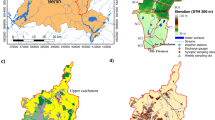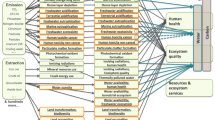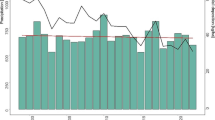Abstract
In this paper, a new methodology is developed for urban runoff management based on global sensitivity analysis of the storm water management model (SWMM) considering uncertainties. The variogram analysis of response surface (VARS) model is utilized for sensitivity analysis of the SWMM parameters by combining the runoff simulation model of the SWMM with VARS. Three model efficiency metrics, namely Nash–Sutcliffe efficiency metric for the runoff, NSE metric for the logarithm of the runoff, and percent bias in simulating runoff are used to evaluate SWMM outputs and rank its parameters. The reliability of the obtained rankings of parameters is evaluated by developing a bootstrapping-based strategy to estimate confidence intervals for the calculated sensitivity values. A multi-objective optimization model is integrated with the calibrated SWMM, to select optimum scenarios of low impact development-best management practice (LID-BMP). To take into account the rainfall uncertainty, design storm hyetograph is stochastically derived using Monte Carlo analysis and Huff curves (Huff in Water Resour Res 3(4):1007–1019, 1967; Time distributions of heavy rainstorms in Illinois, State of Illinois Department of Energy and Natural Resources, Illinois, 1990). Finally, a socially acceptable LID-BMP scenario out of a set of non-dominated solutions is obtained using the Nash bargaining theory. The proposed method is applied to an urban watershed Iran. The resulted LID-BMPs could decrease runoff volume and pollution load by 24% and about 74%, respectively.






Similar content being viewed by others
References
Cano OM, Barkdoll BD (2017) Multiobjective, socioeconomic, boundary-emanating, nearest distance algorithm for stormwater low-impact BMP selection and placement. J Environ Plan Manag 143(1):05016013. https://doi.org/10.1061/(ASCE)WR.1943-5452.0000726
Chui TF, Liu X, Zhan W (2016) Assessing cost-effectiveness of specific LID practice designs in response to large storm events. J Hydrol 533:353–364. https://doi.org/10.1016/j.jhydrol.2015.12.011
Corrêa CJP, Tonello KC, Nnadi E (2021) Urban gardens and soil compaction: a land use alternative for runoff decrease. Environ Process 8:1213–1230
Cressie NA (1993) Statistics for spatial data. John Wiley and Sons, Hoboken, New Jersey
Deb K, Pratap A, Agarwal S, Meyarivan TA, Fast A (2002) NSGA-II. IEEE Trans Evol Comput 6(2):182–197
Duan HF, Li F, Yan H (2016) Multi-objective optimal design of detention tanks in the urban stormwater drainage system: LID implementation and analysis. Water Resour Manag 30(13):4635–4648. https://doi.org/10.1007/s11269-016-1444-1
Eckart K, McPhee Z, Bolisetti T (2017) Performance and implementation of low impact development–a review. Sci Total Environ 607:413–432. https://doi.org/10.1016/j.scitotenv.2017.06.254
Ghodsi SH, Kerachian R, Estalaki SM, Nikoo MR, Zahmatkesh Z (2016a) Developing a stochastic conflict resolution model for urban runoff quality management: Application of info-gap and bargaining theories. J Hydrol 533:200–212
Ghodsi SH, Kerachian R, Zahmatkesh Z (2016b) A multi-stakeholder framework for urban runoff quality management: Application of social choice and bargaining techniques. Sci Total Environ 550:574–585
Ghodsi SH, Zahmatkesh Z, Goharian E, Kerachian R, Zhu Z (2020) Optimal design of low impact development practices in response to climate change. J Hydrol 580:124266. https://doi.org/10.1016/j.jhydrol.2019.124266
Gwenzi W, Nyamadzawo G (2014) Hydrological impacts of urbanization and urban roof water harvesting in water-limited catchments: a review. Environ Process 1:573–593
Huang CL, Hsu NS, Liu HJ, Huang YH (2018) Optimization of low impact development layout designs for megacity flood mitigation. J Hydrol 564:542–558
Huff FA (1967) Time distribution of rainfall in heavy storms. Water Resour Res 3(4):1007–1019
Huff FA (1990) Time distributions of heavy rainstorms in Illinois. State of Illinois Department of Energy and Natural Resources, Illinois, Circular No. 173
Jia H, Wang X, Ti C, Zhai Y, Field R, Tafuri AN, Cai H, Shaw LY (2015a) Field monitoring of a LID-BMP treatment train system in China. Environ Monit Assess 187(6):373. https://doi.org/10.1007/s10661-015-4595-2
Jia H, Yao H, Tang Y, Shaw LY, Field R, Tafuri AN (2015b) LID-BMPs planning for urban runoff control and the case study in China. J Environ Manag 149:65–76. https://doi.org/10.1016/j.jenvman.2014.10.003
Karamouz M, Nazif S (2013) Reliability-based flood management in urban watersheds considering climate change impacts. J Water Resour Plan Manag 139(5):520–533. https://doi.org/10.1061/(ASCE)WR.1943-5452.0000345
Krause P, Boyle DP, Bäse F (2005) Comparison of different efficiency criteria for hydrological model assessment. Adv Geosci 89–97. https://doi.org/10.5194/adgeo-5-89-2005
Lee JG, Selvakumar A, Alvi K, Riverson J, Zhen JX, Shoemaker L, Lai FH (2012) A watershed-scale design optimization model for stormwater best management practices. Environ Modell Softw 37:6–18. https://doi.org/10.1016/j.envsoft.2012.04.011
Li C, Fletcher TD, Duncan HP, Burns MJ (2017) Can stormwater control measures restore altered urban flow regimes at the catchment scale? J Hydrol 549:631–653. https://doi.org/10.1016/j.jhydrol.2017.03.037
Li J, Yao Y, Ma M, Li Y, Xia J, Gao X (2021) A multi-index evaluation system for identifying the optimal configuration of LID facilities in the newly built and built-up urban areas. Water Resour Manag 35(7):2129–2147. https://doi.org/10.1007/s11269-021-02830-6
Li S, Wang Z, Wu X, Zeng Z, Shen P, Lai C (2022) A novel spatial optimization approach for the cost-effectiveness improvement of LID practices based on SWMM-FTC. J Environ Manag 307:114574. https://doi.org/10.1016/j.jenvman.2020.111409
Liu J, Shen Z, Chen L (2018) Assessing how spatial variations of land use pattern affect water quality across a typical urbanized watershed in Beijing, China. Landsc Urban Plan 176:51–63. https://doi.org/10.1016/j.landurbplan.2018.04.006
McGrane SJ (2016) Impacts of urbanization on hydrological and water quality dynamics, and urban water management: a review. Hydrol Sci J 61(13):2295–2311. https://doi.org/10.1080/02626667.2015.1128084
Moriasi DN, Arnold JG, Van Liew MW, Bingner RL, Harmel RD, Veith TL (2007) Model evaluation guidelines for systematic quantification of accuracy in watershed simulations. Trans ASABE 50(3):885–900
Nash JF (1950) The bargaining problem. Econometrica 155–162. https://doi.org/10.2307/1907266
Paule-Mercado MA, Lee BY, Memon SA, Umer SR, Salim I, Lee CH (2017) Influence of land development on stormwater runoff from a mixed land use and land cover catchment. Sci Total Environ 599:2142–2155. https://doi.org/10.1016/j.scitotenv.2017.05.081
Pyke C, Warren MP, Johnson T, LaGro J Jr, Scharfenberg J, Groth P, Freed R, Schroeer W, Main E (2011) Assessment of low impact development for managing stormwater with changing precipitation due to climate change. Landsc Urban Plan 103(2):166–173. https://doi.org/10.1016/j.landurbplan.2011.07.006
Qin HP, Li ZX, Fu G (2013) The effects of low impact development on urban flooding under different rainfall characteristics. J Environ Manag 129:577–585. https://doi.org/10.1016/j.jenvman.2013.08.026
Razavi S, Gupta HV (2016) A new framework for comprehensive, robust, and efficient global sensitivity analysis: 1. Theory. Water Resour Res 52(1):423–439. https://doi.org/10.1002/2015WR017558
Rosolem R, Gupta HV, Shuttleworth WJ, Zeng X, De Gonçalves LG (2012) A fully multiple‐criteria implementation of the Sobol’ method for parameter sensitivity analysis. J Geophys Res Atmos 117(D7). https://doi.org/10.1029/2011JD016355
Rossman LA (2010) Storm water management model user’s manual, version 5.0. National Risk Management Research Laboratory, Office of Research and Development, US Environmental Protection Agency
Saniei K, Yazdi J, MajdzadehTabatabei MR (2021) Optimal size, type and location of low impact developments (LIDs) for urban stormwater control. Urban Water J 18(8):585–597. https://doi.org/10.1080/1573062X.2021.1918181
Singh A, Sarma AK, Hack J (2020) Cost-effective optimization of nature-based solutions for reducing urban floods considering limited space availability. Environ Process 7:297–319
Tansar H, Duan HF, Mark O (2022) Catchment-scale and local-scale based evaluation of LID effectiveness on urban drainage system performance. Water Resour Manag 8:1–20. https://doi.org/10.1007/s11269-021-03036-6
Yang W, Brüggemann K, Seguya KD, Ahmed E, Kaeseberg T, Dai H, Hua P, Zhang J, Krebs P (2020) Measuring performance of low impact development practices for the surface runoff management. Environ Sci Ecotechnol 1:100010. https://doi.org/10.1016/j.ese.2020.100010
Yang W, Zhang J, Krebs P (2022) Low impact development practices mitigate urban flooding and non-point pollution under climate change. J Clean Prod 14:131320. https://doi.org/10.1016/j.jclepro.2022.131320
Zahmatkesh Z, Burian SJ, Karamouz M, Tavakol-Davani H, Goharian E (2015) Low-impact development practices to mitigate climate change effects on urban stormwater runoff: Case study of New York City. J Irrig Drain Eng 141(1):04014043. https://doi.org/10.1061/(ASCE)IR.1943-4774.0000770
Zhang K, Chui TF (2018) A comprehensive review of spatial allocation of LID-BMP-GI practices: Strategies and optimization tools. Sci Total Environ 621:915–929. https://doi.org/10.1016/j.scitotenv.2017.11.281
Funding
The authors declare that no funds, grants, or other support were received during the preparation of this manuscript.
Author information
Authors and Affiliations
Contributions
Contribution of the authors are detailed as: Majid Hashemi: Conceptualization, Methodology, Writing, Original draft preparation, Software. Najmeh Mahjouri: Supervision, Methodology, Validation, Writing, Reviewing and Editing. All authors read and approved the final manuscript.
Corresponding author
Ethics declarations
Conflicts of Interests
The authors declare that they have no known competing interests and relevant financial or non-financial interests to disclose.
Additional information
Publisher's Note
Springer Nature remains neutral with regard to jurisdictional claims in published maps and institutional affiliations.
Supplementary Information
Below is the link to the electronic supplementary material.
Rights and permissions
About this article
Cite this article
Hashemi, M., Mahjouri, N. Global Sensitivity Analysis-based Design of Low Impact Development Practices for Urban Runoff Management Under Uncertainty. Water Resour Manage 36, 2953–2972 (2022). https://doi.org/10.1007/s11269-022-03140-1
Received:
Accepted:
Published:
Issue Date:
DOI: https://doi.org/10.1007/s11269-022-03140-1




